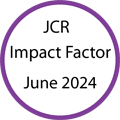Relationships Among Conventional Cardiovascular Risk Factors and Lifestyle Habits With Arterial Stiffness in Type 2 Diabetic Patients
Abstract
Background: While conventional cardiovascular risk factors and certain lifestyle habits are associated with arterial stiffness in patients with type 2 diabetes mellitus (T2DM), it is still unknown whether they are actually associated with arterial stiffness even after adjustment for conventional cardiovascular risk factors and lifestyle habits. The aim of this study was to identify variables that are associated with brachial-ankle pulse wave velocity (baPWV).
Methods: The study participants comprised 724 Japanese T2DM outpatients free of history of cardiovascular diseases. Lifestyle habits were analyzed using self-reported questionnaires. The associations among conventional cardiovascular risk factors and lifestyle habits with baPWV were investigated by multivariable linear regression analysis.
Results: The mean age of the study subjects was 57.8 8.6 years, and 62.8% of those were males. The mean HbA1c was 7.01.0%, and the estimated duration of T2DM was 9.9 7.2 years. Multiple linear regression analysis that included age and gender demonstrated that age and male sex were positively associated with baPWV. In a model adjusted for numerous conventional cardiovascular risk factors and lifestyle habits, age, duration of T2DM, systolic blood pressure, serum uric acid, urinary albumin excretion and poor sleep quality were positively associated with baPWV, while body mass index was negatively associated with baPWV.
Conclusions: In Japanese T2DM, in addition to several conventional cardiovascular risk factors, poor sleep quality was associated with baPWV even after adjustment for numerous conventional cardiovascular risk factors and lifestyle habits.
J Clin Med Res. 2017;9(4):297-302
doi: https://doi.org/10.14740/jocmr2870w











